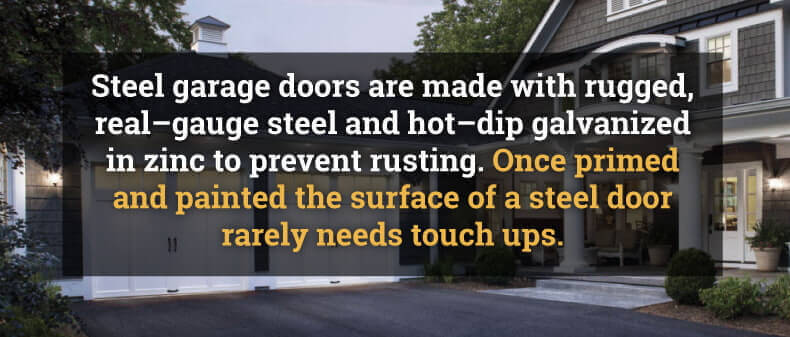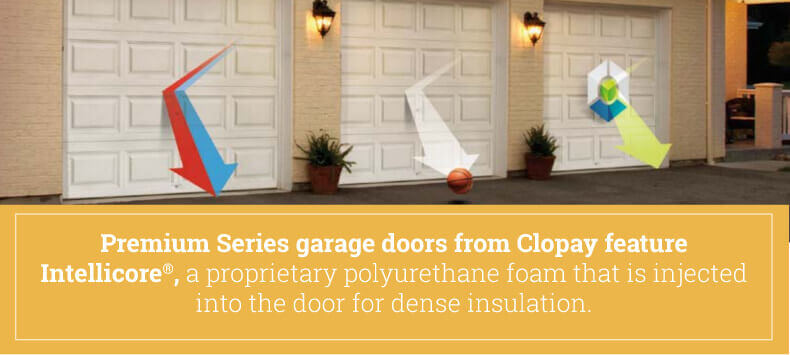When you decide to have new garage door installation performed on your home, it’s important to know about the various types of steel garage doors available on the market.
Steel doors are generally made with heavy–duty steel that requires little maintenance and come in three levels of strength — single, double and triple–layer. The respective qualities of the three levels are as follows:
- Single layer — sometimes referred to as “pan garage doors” — feature solid, durable exteriors that require little maintenance. Due to their thinness, however, single–layer steel doors can get dented when hit, and are generally ill–suited for wide garage door openings.
- Double layer — consists of one steel layer backed with polystyrene thermal insulation. Quieter and more durable than pan doors, the double–layer garage door is a low–maintenance, energy efficient and environmentally sound option.
- Triple layer — comprised of a steel front, thermal middle and steel back. Sometimes referred to as the “sandwich garage door,” the steel triple layer is the strongest and most durable of garage door options on the market. With heavy–duty material on the outside and inside, this low–maintenance door contains eco–friendly polystyrene thermal insides that can help boost a home’s energy efficiency. Furthermore, this conveniently soundproof door is quiet to open and shut.
Steel garage doors are made with rugged, real–gauge steel and hot–dip galvanized in zinc to prevent rusting. This is followed by a primer coat for additional surface strength, and finished with topcoat paint, for strong, lasting color. The surface of a steel door rarely needs touch ups.
Non–insulated, single–layer garage doors generally come in one of three gauges of thickness — 24, 25 and 26. The lower the number, the thicker the metal. The two–layer garage door is typically backed with a vinyl layer, which holds the insulation in place. Thicker doors have a better R–value, which is used for determining how well the door insulates its enclosure and thereby designating its energy-efficiency. The best type of steel garage door is the triple–layer steel back with at least two inches if thickness.
Many newer garage doors are reinforced with wind–load reinforcements, which are now required in several states, including California, Missouri and Nevada. Reinforced garage doors look the same as other doors, but are compliant with local building codes.
The Benefits of Single-layer Garage Doors
The single–layer steel garage door is an adequate choice for anyone looking for a simple and reliable door that can seal off a garage from the outside without buckling under harsh natural conditions.
#1. Light Weight
The most convenient thing about pan steel garage doors is that they’re relatively light weight, and therefore don’t require much mechanical or physical force to move up and down. If you opt not to have an electrically operable garage door setup, a single–layer door would be the easiest option to manage of all the steel garage door types. Granted, a manual–only garage door is most suitable for households where bikes or motorcycles, as opposed to cars or vans, are the preferred means of transportation, because it can be tedious to get out of a vehicle just to activate a door.
The lighter weight of a single layer garage door also means that there is less impact when it reaches the ground, and less weight to lift by hand. Therefore, if a garage door opening system fails, the problem is easier to rectify manually.
#2. Durable Surface
As with all steel garage doors, the single layer also boasts a strong surface, which makes it ideal for any type of climate. Whereas doors made of wood and vinyl can buckle under certain conditions, steel will hold its shape and surface quality throughout the coldest of winters and hottest of summers. Even in areas that see weeks on end of heavy downpour and harsh storms of snow and hail, steel is the most resilient material for a garage door surface.
The strength and durability of the steel surface stands in marked contrast to vinyl, which can get damaged in climates where extreme weather is a seasonal reality. Whereas the surface of a vinyl garage door can warp in the midst of excessively humid conditions, or become brittle and crack in freezing temperatures, the surface of steel simply warms and cools with no alteration of the composition.
The Benefits of Double-layer Garage Doors
Double–layer steel garage doors are a sensible option for homeowners who care about qualities like thermal protection, strength and durability in a garage door.
#1. Stronger
One of the most obvious benefits that double–layer steel garage doors have over pan doors is improved strength. It’s the layer of insulation that makes these doors thicker, which in turn makes them less prone to dents or easy damage. If your garage door sees lots of usage, minor accidents can and most likely will happen from time to time, such as when a flying ball or object hits the door. In order to keep a door protected against such an impact, it’s necessary to have more than just a thin layer of steel for a garage door.
Due to the additional strength of a double–layer door, problems such as bends, folds and cracks along the panel are less likely to occur, because the door is much more durable and therefore primed to handle years of operation. As such, any garage put to regular use — especially when the garage is attached to the house — should have a double–layer door at minimum.
#2. More Insulating
Double–layer garage doors are also more insulating than single–layer garage doors, which is a really important advantage for any residential property. If your garage is incorporated into the framework of your house, the door itself will serve as the single largest entryway into your home. Therefore, insulation is necessary to prevent air from passing in and out of the garage, because that same air will compromise the comfort of your living areas.
If your garage is separate from your house, it’s still best to have a door with insulation, because you won’t want the belongings within your garage to be overexposed to hot and cold weather cycles. Most of all, your car should not be parked overnight for weeks on end in a garage that has no thermal protection from the icy cold temperatures of December and January. Even if you only use this detached garage for storage or woodwork, the space and contents within will be best preserved with the insulation that a steel garage door with at least two layers can provide.
#3. Low Maintenance
A double–layer steel garage door is unlikely to need any maintenance over the course of time that you occupy a residency. Along the outer surface of a steel garage door, the paint is unlikely to chip, dent or wear away in any spot. Therefore, you won’t have to worry about matching a color to touch up spots or go through the trouble of repainting the entire door.
Garage doors of this type won’t rust either, which is even more important when you consider the nature of steel. On an uncoated piece of steel, rust is like kryptonite. Once it forms on a steel surface at any particular spot, it can spread to surrounding areas. The worst thing about rust is not that it diminishes the appearance of metal, but that it actually has the power to eat holes through the metals it infects. For obvious reasons, this would be a very dangerous condition for any garage door. Thankfully, double–layer steel garage doors are zinc–coated to prevent the possibility of rust.
The Benefits of Triple-layer Garage Doors
Triple–layer steel garage doors are the best option for homeowners looking for thermal comfort, durability, strength, longevity, quietness and energy efficiency in a garage door.
#1. Strength
Triple–layer models are the strongest option out of all the different types of steel garage doors, with a durability that can withstand the physical tests of time, weather, children and even cars. Even after years of continual use, you probably won’t need to paint the surfaces, seal gaps or replace any panels, because nothing is likely to come undone on a sandwich door. When you have a door with this level of strength and durability, the impacts of snow, hail and other harsh weather elements are non-issues.
If someone in your household enjoys shooting hoops in the driveway, there’s no need to worry about the door getting dented by hits from a basketball. If there are younger members of your household who play on bikes or tricycles and accidently run into the door, there’s little chance of the door even getting scraped, let alone dented. Even if you accidentally hit the door with the bumper of your vehicle while pulling into the driveway, a triple–layer door is usually strong enough to come out unscathed.
#2. Thermal Qualities
Out of all the garage door types on the market, triple–layer steel doors offer an unsurpassed level of thermal comfort. Whereas single–layer doors merely close off your house from intrusion, downpour and vehicle theft, triple–layer doors block the passage of heat and cold temperatures between the inside and outside of your home. This can be very beneficial when you consider how discomforting the weather can be at certain times of the year, especially now that seasonal shifts are becoming more and more extreme.
Premium Series garage doors from Clopay feature Intellicore® insulation technology. Intellicore® is a proprietary polyurethane foam that is injected into the door for dense insulation. The results are an industry leading R-Value of 18.4. During the summer, the twin layers of steel and the inner thermal protection will keep humidity out of your air conditioned home. Likewise, that same triple–layer design will block icy cold temperatures from seeping into your garage and diluting the warmth of your living space. As such, you won’t have to cope with harsh temperatures in discomforting ways, such as by wearing thick extra layers during the holidays and next to nothing during the middle of each year.
#3. Energy Efficiency
The thermal qualities of a garage door also relate to energy efficiency, which doors of the triple–layer steel variety offer in spades. When you don’t have to worry about compromised insulation, you can rest assured that your energy bills will stay at a minimum. When there’s no heat leaking out of your house in the winter, nor any AC breeze getting diluted by outdoor humidity, you don’t have to crank up your HVAC system to compensate.
A lot of homeowners don’t even realize the financial impact of weakened insulation in their homes. For example, the seals around a door or window might be compromised over time and ultimately lead to gaps that allow for the passage of air between the inside and outside. Gradually, a homeowner will unconsciously crank the HVAC high and higher to make up for the loss in insulation. Over time, this can lead to energy expenses that will exceed the cost of insulation maintenance.
As the largest entryway to your home, the insulation of your garage door is one of the most important qualities for the comfort and energy efficiency of your home.
#4. Quietness
Quietness as a feature doesn’t stand out to many homeowners when buying a new garage door, but it’s actually very important when you consider just how much noise a steel triple–layer can block from your home. Just as with your living room, where high–quality window panes and sills are necessary to prevent outside noise from interrupting your evenings, a thick garage door is necessary to block out the sound of rowdy neighbors and the roar of passing vehicles on your block of residence.
In fact, one of the biggest mistakes that a homeowner can make is to skimp with a thin garage door, without even considering the potential for noise intrusion. Once you’ve had too many dinners or nights by the fire interrupted by shouting neighbors and revved up engines, you ultimately come to realize that soundproofing is just as important as temperature insulation. Triple–layer steel doors have not just one, but two thick layers of steel to block out noise, in addition to a layer of insulation to prevent echoing.
Single-layer vs. Triple-layer
Pan doors can be dented by children running their bikes into the door, or when a ball hits the door during games of driveway basketball. Worse yet, a car might accidentally bump a pan door while pulling into the driveway and cause more serious damage. However, these same problems generally don’t occur with sandwich doors.
The two most common warning signs that a pan door is about to collapse is when the top panel comes undone from the surrounding frame when the door is shut, or when cracks appear in the top panel when the door is raised.
The price difference between a pan door and a sandwich door is roughly the same as the cost to replace a damaged panel on a pan door. A pan door can be purchased in insulated form, where a layer of insulation is added to the inside, but doesn’t add much strength overall.
Steel Doors vs. Wood Doors
Wooden garage doors are made of fine milled wood that gives them a timeless visual appeal. Well–crafted and intricate in detail, wooden doors are made in painted or stained varieties. The environmentally sound insulation within wooden doors is comprised of polystyrene, which can therefore boost a home’s energy efficiency.
Even though wood is environmentally sound and visually appealing, it’s not the strongest of materials for use on a garage door. Harsh seasons can take their toll on the surface of wood, which can untimely crack along areas that get hit, or develop mold formations on spots where coating rubs off.
Steel garage doors, by contrast, consist of stronger material that doesn’t crack or mold, and that comes in various sizes and colors.
Steel Doors vs. Vinyl Doors
Vinyl doors consist of laminated front panels and back surfaces, as well as steel and foam cores. Doors with vinyl surfaces are generally less expensive than wood doors, but costlier than steel garage doors.
However, vinyl is not the environmentally friendly garage door option. The material can warp on homes situated in regions with more extreme climates, and can also be rendered brittle by freezing temperatures. On the other hand, vinyl garage doors are good for homes built in coastal areas, because vinyl is resistant to air salt.
Some of the problems with vinyl have been rectified on newer garage doors, which are generally more reliable. Modern vinyl doors are made with C–channel steel reinforcement on each panel, and coated with polymers to resist ultraviolet rays.
Vinyl doors are produced in various colors, and the material provides better insulation than wood. Vinyl can also be made to look like various different types of wood. However, the look of wood is more authentically replicated with fiberglass.
Steel Doors vs. Aluminum Doors
Aluminum doors have a number of surface benefits, because the material is rustproof, low cost, low maintenance and lightweight. As such, aluminum garage doors are easy to operate. Tilt–up and single–piece aluminum doors are the lowest cost varieties. Insulated aluminum doors cost twice as much as single piece, but are reasonably priced compared to steel doors.
Glass–aluminum garage doors are made with a range of window options with light–blocking features. The material is rust–resistant, low maintenance and comes in various colors.
However, aluminum is not as strong as steel. Consequently, aluminum garage doors are likelier to dent. Furthermore, aluminum doors can render a home less energy efficient, because the material doesn’t block the flow of heat. Even though aluminum doors are enhanced with insulation, this is uncommon in most manufactured aluminum garage doors.
Steel garage doors, on the other hand, do not warp, dent or sag at the center. Steel doors can be also be soundproofed and insulated with foam, which is not possible with aluminum. While aluminum doors are a reliable, low–cost option for garages not attached to homes, and the material can be aesthetically attractive, aluminum is the ideal option for garages attached to homes.
Get a New Garage Door Installation from Custom Door & Gate
At Custom Door & Gate, we carry a range of Clopay steel garage door types in one–layer, three–layer and even four–layer varieties. Four–layer garage doors consist of twin steel exteriors with insulation at the center and a composite overlay. Clopay steel doors are available in several colors, including almond and sandstone. The doors are designed in flat top and arched varieties, and feature insulation layers with two options of thickness. We also carry wooden Clopay garage doors in a variety of designs and sizes.
If you’re looking to have a new garage door installation, look no further than Custom Door & Gate. For more than 25 years, we’ve performed installations of various types of steel garage doors on residential and commercial properties. To find out more about the different types of garage doors that we offer, or to schedule a repair or installation, complete our contact form today.











